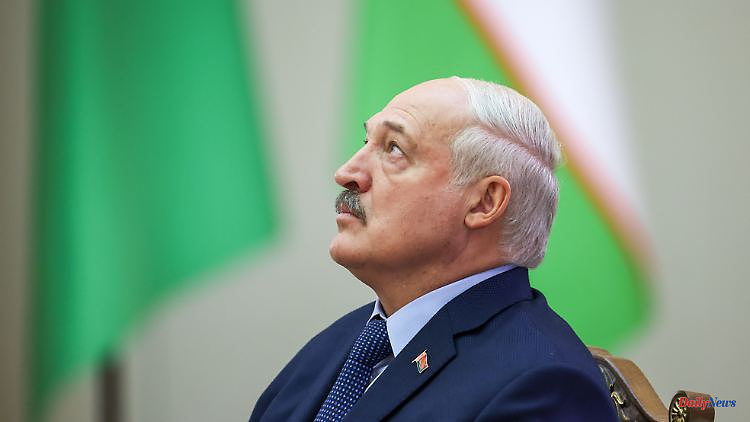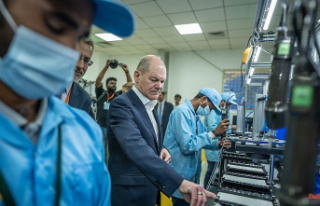At least since the bloody crackdown on the protests in 2020, Alexander Lukashenko is no longer in control of the situation in Belarus. He continues to rule with an iron fist, but the important decisions are made in Moscow. The full incorporation of Belarus by Russia seems only a matter of time.
A few days ago, several European media reported on a secret document from the Moscow presidential administration that is said to describe plans for the gradual takeover of Belarus by Russia. While the publication caused a lot of attention and horror in the West, society in Belarus reacted more cautiously. Because there you have been seeing for years or even decades how the Kremlin's plans are being implemented.
According to media reports, the internal Kremlin document from the summer of 2021 entitled "Strategic Goals of the Russian Federation in Belarus" describes how Russia intends to incorporate the neighboring country bit by bit by 2030 without the need for military intervention. Accordingly, the population should be influenced more and more pro-Russian, while western influences should be pushed back. In 2030, Russia and Belarus should finally become a "union state" with uniform border, customs and tax policies, a common military leadership and a common currency. Russian should become the dominant state language.
The idea of creating a union state is not new and not a secret. The Belarusian ruler Alexander Lukashenko and the then Russian President Boris Yeltsin signed a treaty on the union of the two states in 1997. The project has not yet been implemented. Lukashenko, who could have played only a subordinate role in the alliance with Russia, managed until recently to avoid closer integration with Russia. The protests after the rigged presidential election in August 2020 changed the situation abruptly.
Lukashenko, who used excessive force to crush peaceful rallies, went from being a president maneuvering skillfully between Russia and the West to an outcast who was only able to remain in power thanks to help from the Kremlin. At the time, Russia not only recognized Lukashenko's election victory - which only a few other countries in the world have done - but also supported his regime with a loan worth billions. And Putin said as early as August 2020 that he would support Lukashenko with Russian security forces should the protests escalate. Russia was ready to provide the regime with "any support to prevent a coup d'etat," Russian Foreign Minister Sergey Lavrov admitted on Belarusian state television in June last year.
"A more energetic protest would have provoked an armed intervention by Russia," political analyst Yuri Drakochrust recently wrote in an article for the news portal Zerkalo. "What Russia did in Ukraine in February 2022 would have happened in Belarus in 2020."
At the latest after the protests were crushed, Lukashenko became a puppet of the Kremlin. The return payment for the political and economic support was not long in coming. In November 2021, after years of hesitation, Lukashenko gave in and signed a decree on integration into a union state with Russia. The document envisages a total of 28 integration programs - including a coordinated military doctrine.
A few months later, Russian troops invaded Ukraine from Belarus, among other places. Since then, there has been constant speculation that Belarus could soon go to war with its armed forces. In November last year, referring to the Union State's military doctrine, Lukashenko announced the creation of a joint force with Russia.
From these examples one can see how far Russia has progressed in its plans to incorporate Belarus. Due to its isolation, Lukashenko's regime is already completely dependent on the Kremlin, politically and economically.
A clear expansion of Russian influence can also be observed in other areas. In the past two years, the regime has smashed the country's media landscape. Not a single independent editorial board remained in Belarus, but some continue their work abroad. State media are increasingly spreading narratives of Russian propaganda.
Observers draw attention to the increasingly aggressive rhetoric in the reporting, which has been intensified even further since the Russian invasion of Ukraine. This can be explained, among other things, by the fact that Lukashenko had numerous Belarusian journalists from state media replaced by propagandists from the Kremlin broadcaster RT after a massive wave of layoffs and strikes in autumn 2020.
The Belarusian language, which has been vehemently suppressed since Lukashenko came to power in 1994, now only leads a marginal existence. In everyday life it is hardly used. Anyone who speaks Belarusian in public in Minsk, for example, is looked at funny. If in 2005 around a quarter of the pupils were taught in their native language, according to official figures it is only ten percent today, and the trend is falling.
In recent years, the government has closed several Belarusian-language publishing houses and bookstores - such as "Knihauka" in Minsk. The shop opened in May 2022 in the center of Minsk, just a few hours later the police came to the bookshop, searched it and arrested the founder and an employee. Shortly before, three well-known propagandists had complained on social media after visiting the store that there was "not a single book in Russian here".
The Kremlin's plans that have now been leaked and the developments of recent years show how Lukashenko is jeopardizing Belarusian statehood in order to stay in power. They also make it clear that there are currently only two possible scenarios for Belarus: either allow itself to be annexed by Russia without resistance, or fight back for independence. The example of Ukraine, which has been fighting bitterly for its freedom for nine years now, shows how difficult this is.












